|
De Australische schrijver John Birmingham werd geboren op 7 augustus 1964 in Liverpool, Engeland. Zie ook mijn blog van 7 augustus 2010 en eveneens alle tags voor John Birmingham op dit blog.
Uit: Weapons of Choice
“He unwrapped the banana leaves from around a small rice cake, thanking Allah for the generosity of his masters. They had included a little dried fish in his rations for today, a rare treat.
Sometimes, when the sun climbed directly overhead and beat down with a slow fury, Adil's thoughts wandered. He cursed his weakness and begged God for the strength to carry out his duty, but it was hard. He had fallen asleep more than once. Nothing ever seemed to happen. There was plenty of movement down in Dili, which was infested with crusader forces from all over the Christian world, but Dili wasn't his concern. His sole responsibility was to watch those ships that were hiding in the shimmering haze on the far horizon.
Still, Adil mused, it would be nice to know he had some real purpose here; that he had not been staked out like a goat on the side of a hill. Perhaps he was to be part of some elaborate strike on the Christians in town. Perhaps tonight the darkness would be torn asunder by holy fire as some martyr blew up one of their filthy taverns. But then, why leave him here on the side of this stupid hill, covered in monkey shit and tormented by ants?
This wasn't how he had imagined jihad would be when he had graduated from the Madrasa in Bandung.
USS Kandahar, 1014 Hours, 15 January 2021
The marines wouldn't have been surprised at all to discover that someone like Adil was watching over them. In fact, they assumed there were more than two hundred million pairs of eyes turned their way as they prepared to deploy into the Indonesian Archipelago.
Nobody called it the Caliphate. Officially the United States still recognized it as the sovereign territory of Indonesia, seventeen thousand islands stretching from Banda Aceh, three hundred kilometers off the coast of Thailand, down to Timor, just north of Australia. The sea-lanes passing through those islands carried a third of the world's maritime trade, and officially they remained open to all traffic. The Indonesian government-in-exile said so-from the safety of the Grand Hyatt in Geneva where they had fled, three weeks earlier, after losing control of Jakarta. »
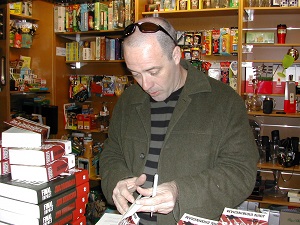
John Birmingham (Liverpool, 7 augustus 1964)
De Nederlandse dichter en prozaïst Cees Buddingh’ werd op 7 augustus 1918 geboren in Dordrecht.Zie ook mijn blog van 7 augustus 2010 en eveneens alle tags voor Cees Budding’ op dit blog.
Over God
Over God denk ik
maar zelden na.
Straks, als we dood zijn,
zullen we 't wel merken.
Hoewel: hoogstwaarschijnlijk
merken we niks.
Fini is 't kortstondig feest.
We zijn er gewoon geweest.
Zichtbaar/onzichtbaar
De lamp boven mijn tafel
weerspiegelt zich tweemaal
in de ramen van mijn erker.
Als roerloze, zacht-crème hemellichamen,
hangen zij boven de Bankastraat,
onzichtbaar voor wie er onderdoor loopt.
Zeer kleine ode aan de liefste
vanochtend
zag ik op straat
een leeg heinz-blikje liggen:
en onmiddellijk
dacht ik aan jou:
57 varieties
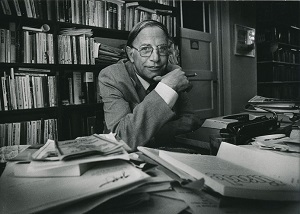
Cees Buddingh’ (7 augustus 1918 - 24 november 1985)
De Nederlandse dichteres Diana Ozon (pseudoniem van Diana Groenveld) werd geboren in Amsterdam op 7 augustus 1959. Zie ook alle tags voor Diana Ozon op dit blog.
Tanneke
We zitten tegenover elkaar
Kleine meisjes in rechte jurkjes
twee lappen coupeloze stof
met steile schouderbandjes
Brildragend zijn wij en jij
een glas mat afgeplakt
Je hebt een lui oog en we staren
naar het schaakbord tussen ons.
Met opgetrokken knieën doen we
het herdersmatje dat
je leerde van je broer die het had
van de fagotspelende buurman
Twee vrouwen beheersen het bord
Te jong om pionnen te zien als mannen
maar de koning is een sukkel
aan voeten gebonden
de lopers onze bodes en wij
vorstinnen triomferend op elk vlak
hartsvriendinnen en in het spel
ieder voor zich en keihard
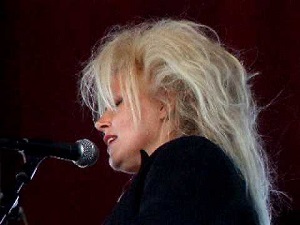
Diana Ozon (Amsterdam, 7 augustus 1959)
De Russische schrijver Vladimir Sorokin werd geboren op 7 augustus 1955 in Bykovo bij Moskou. Zie ook mijn blog van 7 augustus 2010 en eveneens alle tags voor Vladimir Sorokin op dit blog.
Uit: Day of the Oprichnik (Vertaald door Jamey Gambrell)
“The ruble’s up another half-kopeck against the yuan.
Tanyusha serves cheese pancakes, steamed turnips in honey, and cranberry kissel. Unlike Fedka, Tanyusha is fair of face and fragrant. Her skirts rustle pleasantly.
The strong tea and cranberry return me to life. I break into a healthy sweat. Tanyusha hands me a towel that she embroidered. I wipe my face, stand, cross myself, and thank the Lord for the meal.
It’s time to get down to business.
The barber, a newcomer, is already waiting in the dressing room, to which I proceed. Silent, stocky Samson bows and seats me in front of the mirror; he massages my face and rubs my neck with lavender oil. His hands, like those of all barbers, are unpleasant. But I disagree in principle with the cynic Mandelstam—the authorities are in no way “repellent, like the hands of a beard-cutter.” They’re lovely and appealing, like the womb of a virgin needleworker embroidering gold-threaded fancywork. And the hands of a beard-cutter are … well, what can you do—women are not allowed to shave our beards. From an orange spray can labeled “Genghis Khan,” Samson spreads foam on my cheeks with extreme precision; without touching my beautiful, narrow beard he picks up the razor and sharpens it on the strop in sweeping strokes. He takes aim, tucks in his lower lip, and begins to remove the foam from my face, evenly and smoothly. I look at myself. My cheeks aren’t very fresh anymore. These last two years I’ve lost half a pood. Circles under my eyes are now the norm. All of us suffer from chronic lack of sleep. Last night was no exception.
Exchanging his razor blade for an electric machine, Samson deftly trims my poleaxe-shaped beard.
I wink at myself sternly: “A good morning to you, Komiaga!”
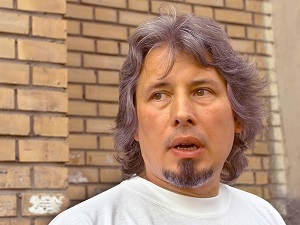
Vladimir Sorokin (Bykovo, 7 augustus 1955)
De Duitse dichter, schrijver en filmmaker Michael Roes werd geboren op 7 augustus 1960 in Rhede. Zie ook mijn blog van 7 augustus 2010 en eveneens alle tags voor Michael Roes op dit blog.
Uit: Zeithain
“Ich heiße Philip Stanhope, wie mein Großvater, der letzte Graf von Chesterfield, mein Ururgroßvater, Admiral der Royal Navy, und mein Ururururgroßvater, jener junge missratene Philip Stanhope, unehelicher Sohn des gleichnamigen Vaters, Vierter Graf von Chesterfield, der seine berühmten, doch letztendlich vergeblichen Briefe an seinen Sohn über die anstrengende Kunst, ein Gentleman zu werden an ebendiesen Philip Stanhope adres-siert hat. Nicht nur die Namensgleichheit, auch die unehelichen Verhältnisse durchziehen meine Genealogie wie ein miss-tönendes Leitmotiv. Der berühmte Vater meines ihn letztlich enttäuschenden Ururururgroßvaters war mit Petronella Melu-sina von der Schulenburg, der unehelichen Tochter von König Georg I. und seiner Mätresse, Ehrcngard Melusine von der Schu-lenburg, vermählt. Diese Ehe aber blieb kinderlos, sonst hätte ich mich nun einer königlichen, wenngleich illegitimen Abstam-mung rühmen können. Indessen nahm auch der Vierte Graf von Chesterfield es mit der ehelichen Treue nicht so genau und zeugte meinen Ahnen mit einer dubiosen Mademoiselle Elisabeth du Bouche', deren genaue Herkunft in den Familienarchiven dun-kel bleibt. Und der aus dieser Liaison entsprungene Philip Stan-hope hatte ebenfalls nichts Besseres zu tun, als der Mode seiner Zeit zu folgen und auf seiner Grand Tour in Rom den von einem Zeitgenossen als •plain almost to ugliness« beschriebenen Reizen meiner Ururururgroßmutter Eugenia Peters zu verfallen. Er war gerade mal achtzehn Jahre alt, sie zwanzig. Ihrem Schoße ent-sprangen Charles und der nächste Philip Stanhope, geheiratet haben die beiden aber erst Jahre nach der illegitimen Geburt ihrer Söhne 1730, im Jahr von Kattes Hinrichtung, in Dresden, und von der Existenz seiner Enkel erfuhr der Vierte Graf von Chester-field erst nach dem frühen Tod seines Sohnes. Diese mehr illustre als ehrenvolle Ahnengalerie hilft mir nicht einmal in grundlosen Phasen der Schwermut, meine von Selbst-mitleid und Minderwertigkeitsgefühlen gemarterte Seele aufzurichten.“
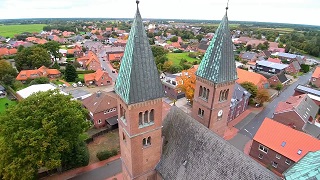
Michael Roes (Rhede, 7 augustus 1960)
Rhede
De Duitse dichter, schrijver, cabaretier en schilder Joachim Ringelnatz (eig. Hans Bötticher) werd geboren op 7 augustus 1883 Wurzen bij Leipzig. Zie ook mijn blog van 7 augustus 2010 en eveneens alle tags voor Joachim Ringelnatz op dit blog.
Morgenwonne
Ich bin so knallvergnügt erwacht.
Ich klatsche meine Hüften.
Das Wasser lockt. Die Seife lacht.
Es dürstet mich nach Lüften.
Ein schmuckes Laken macht einen Knicks
Und gratuliert mir zum Baden.
Zwei schwarze Schuhe in blankem Wichs
Betiteln mich „Euer Gnaden“.
Aus meiner tiefsten Seele zieht
Mit Nasenflügelbeben
Ein ungeheurer Appetit
Nach Frühstück und nach Leben.
An einem Teiche
An einem Teiche
Schlich eine Schleiche,
Eine Blindschleiche sogar.
Da trieb ein Etwas ans Ufer im Wind.
Die Schleiche sah nicht was es war,
Denn sie war blind.
Das dunkle Etwas aber war die Kindsleiche
Einer Blindschleiche.
Die Ameisen
In Hamburg lebten zwei Ameisen,
Die wollten nach Australien reisen.
Bei Altona auf der Chaussee,
Da taten ihnen die Beine weh,
Und da verzichteten sie weise
Dann auf den letzten Teil der Reise.
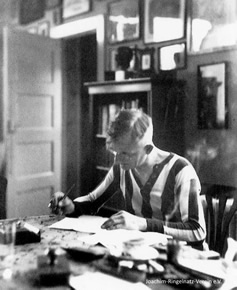
Joachim Ringelnatz (7 augustus 1883 – 17 november 1934)
De Amerikaanse schrijver en radiomaker Garrison Keillor werd geboren op 7 augustus 1942 in Anoka, Minnesota. Zie ook alle tags voor Garrison Keiler op dit blog en ook mijn blog van 7 augustus 2010.
Uit: Wobegon Boy
“I was named for my great-grandfather John Tollefson, who landed in Lake Wobegon, in the center of Minnesota, from Voss, Norway, in 1880. Lake Wobegon was a rough town then, where, all on one block, for less than five dollars, you could get a tattoo, a glass of gin, and a social disease, and have enough left over to get in a poker game, but Lutherans civilized it. They were hard workers, indifferent to vice. John and his wife, Signe, came from Voss and begat Einar, and Einar and Birthe (Birdy) begat Byron, and Byron and Mary begat me, John, the third of five children, with Bill and Diana ahead of me and Ronnie (Byron, Jr.) and Judy after.
It was a good place to grow up in, Lake Wobegon. Kids migrated around town as free as birds and did their stuff, put on coronations and executions in the long, dim train shed and the deserted depot, fought the Indian wars, made ice forts and lobbed grenades at each other, dammed up the spring melt in the gutters, swam at the beach raced bikes in the alley. You were free, but you knew how to behave. You didn't smart off to your elders, and if a lady you didn't know came by and told you to blow your nose, you blew it. Your parents sent you off to school with lunch money and told you to be polite and do what the teacher said, and if there was a problem at school, it was most likely your fault and not the school's. Your parents were large and slow afoot and they did not read books about parenting, and when they gathered with other adults, at Lutheran church suppers or family get-togethers, they didn't talk about schools or about prevailing theories of child development. They did not weave their lives around yours. They had their own lives, which were mysterious to you.
I remember the day I graduated from tricycle to shiny new two-wheeler, a big day. I wobbled down Green Street and made a U-turn and waved to Mother on the front porch, and she wasn't there. She had tired of watching me and gone in. I was shocked at her lack of interest. I went racing around the corner onto McKinley Street, riding very fast so I would have big tales to tell her, and I raced down the hill past the Catholic church and the old black mutt ran out to greet me and I swerved and skidded on loose gravel and tumbled off the bike onto the pavement and skinned myself and lay on the tar, weeping, hoping for someone to come pick me up, but nobody came. The dog barked at me to get up. I limped three blocks home with skin scraped off my forearm and knee, my eyes brimming with tears, and when I came into the kitchen, she looked down at me and said, "It's only a scrape. Go wash it off. You're okay."
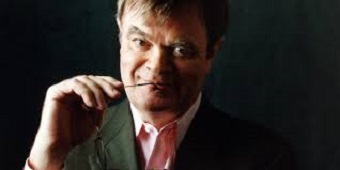
Garrison Keillor (Anoka, 7 augustus 1942)
De Duitse dichter, schrijver, essayist en vertaler Dieter Schlesak werd geboren in Sighişoara, Roemenië, op 7 augustus 1934. Zie ook alle tags voor Dieter Schlesak op dit blog en ook mijn blog van 7 augustus 2010.
Weiße Gegend
Für Jürgen M.
1
Ein weißer Marmorblock
wie schweres Papier
klebt hart an meiner Wange.
Ich halte sie hin / mir zu
nur probeweise.
Schlimmer war in Carrara
das weiße Todesgewicht
der Blöcke / – Kunst
die immer schon Sklaven tötete.
Die ersten Intellektuellen
waren dabei. / Entsetzlich hoch
der Gedanke / und schwer
kaum zu erreichen: genau
wie der Herr −
wälzend also täglich
ihm zu den Block voller Zweifel
als wärs die Strafe
für unser Wachsein.
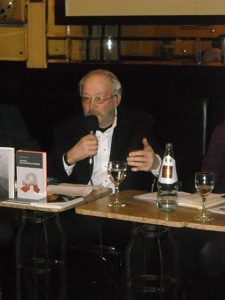
Dieter Schlesak (Sighişoara, 7 augustus 1934)
Onafhankelijk van geboortedata
De Franstalige dichter en ridder Othon III de Grandson werd geboren tussen 1340 en 1350. Zie ook alle tags voor Othon III de Grandson op dit blog.
Balade de sens
Quand se pourra tout réformer ?
Quand sera paix et vrai amour ?
Quand verrai-je l'un l'autre aimer ?
Quand verrai-je parfaite honnour ' ?
Quand aura connaissance tour,
Vérité, loi, pitié, raison ?
Quand sera justice et saison ?
Quand les mauvais punis seront ?
Quand aura roi juste maison ?
Quand les sages gouverneront.
Qui fait les choses mal aller ?
Qui nous a fait tant de doulour * ?
Les fols en état élever,
Les sages laisser en détour,
Les vaillants mettre au cul du four,
Faire injustice et déraison,
Convoitise orgueil, trahison,
Et trop d'officier qui iront
A honte et à perdition ?
Quand les sages gouverneront ?
L'un court aux états demander ;
C'est aux requérents deshonneur,
Qui n'est digne de l'exercer.
On doit élire sans faveur
Prudhomme qui soit de valeur
Dans son su.
Telle élection
Fait bon fruit sans destruction.
Les princes par ce régneront
Et leur peuple en vraie union,
Quand les sages gouverneront.
Prince pour la grant * charge ôter,
Veuillez du peuple modérer
Sur tant d'offices qui trop sont,
Et à droit nombre ramener.
Lors ne pourra que bien aller
Quand les sages gouverneront.
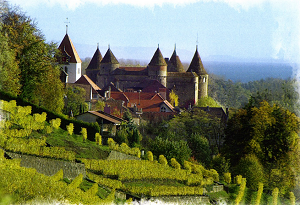
Othon III de Grandson (1340-1350 - 7 augustus 1397)
Château de Grandson
Zie voor nog meer schrijvers van de 7e augustus ook mijn blog van 7 augustus 2011 deel 2.
07-08-2017 om 18:27
geschreven door Romenu 
Tags:John Birmingham, Cees Buddingh’,, Diana Ozon, Vladimir Sorokin, Michael Roes, Joachim Ringelnatz, Garrison Keillor, Dieter Schlesak, Othon III de Grandson, Romenu
|

